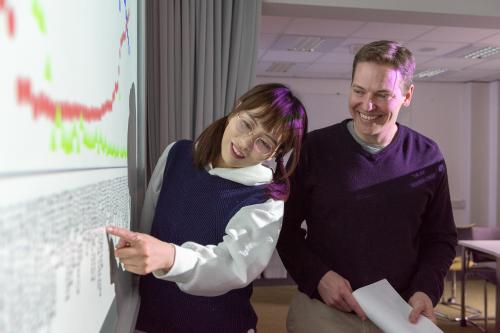Bigger Picture | How We Say Things


The way ahead is seeing the bigger picture behind what we say and how we say it

Dr Christopher Strelluf, Applied Linguistics, Warwick

People often think that language is something that’s fixed. And when it comes to how we use it, there’s a common misconception that some things are inherently right or wrong, better or worse. My work highlights how language is really a reflection of ourselves as individuals, groups and societies – our beliefs, our experiences and our prejudices.
Trust me: language matters in more ways than you might think.
Before I was an academic, I served as an officer in the US Army in Afghanistan. My colleagues and I were working to help develop messages for the local civilian population, and we noticed that in one rural border region, people weren’t responding to the communication that they were receiving. It took a while, but eventually the penny dropped.
The broadcaster had a Kandahar accent that people in this part of the country instinctively don’t trust when it came to matters of agriculture. Whether they knew it or not, the locals were ignoring the information we were putting out there because of their linguistic perceptions – and giving me a great example of how language affects everyday life in the process.
Something else that often strikes me is how the phonetic changes that occur over the years can effectively create time capsules. In my role at Warwick, I’ve been working with the Coventry Archives to digitise oral history collections, many of which are recordings of coal miners who came to the area from places like Wales and Durham in the early 1900s.
Of course, I’m primarily studying the linguistic features involved, but listening to those voices reveals some fascinating insights into how they felt the city was now their home, how a diversity of cultures came together, and how the Coventry dialect was partly shaped by those demographic changes.
I think it’s so important to delve back into history in this way.
In linguistics, there are mainstream explanations for some features of sound change that I believe are problematic; we haven’t really looked at old enough data to understand the full picture, so we must do whatever we can to go as far back as possible.
I’ll give you an example. In 2018, I wrote a book called Speaking from the Heartland: the Midland Vowel System of Kansas City, for which I used the Missouri State Archives quite extensively. There’s a city called Lathrop that’s now effectively a suburb of Kansas City with a population of a few thousand. 
You look at it today and it’s ideologically conservative, culturally rural and socially and economically homogenous. But this small place experienced a huge boom around the Boer War and the First World War as “the mule capital of the world”, welcoming representatives from Britain, France and other allied countries in the process.
Through my research, I discovered that despite the impressions a modern visitor to Lathrop might take away, a little over a century ago it was an incredibly multicultural, multilingual melting pot. Sepoy soldiers were participating in Muslim burial rites. Locals were transporting mules and horses all the way to Europe. There was just so much going on.
Without understanding the historical context, linguists like me could make the wrong assumptions about the present-day local dialect, or even misunderstand the social relationships at play behind the recorded speech patterns of someone from the period.
My hope is that by developing advanced methodologies that interrogate some of the explanations that are already widely adopted in the field, I can at least move the needle a bit.
Linguistics – and academia as a whole – is all about challenging the assumed and seeking truth. It’s why I feel fortunate to be at Warwick; you can sense an ethos of bravery and a freedom to be experimental. We’ve been given the space to develop a very unique undergraduate programme, where students will combine one-to-one tutorials and some intensely personally driven work.
And that’s exciting because there will continue to be a lot of collaboration with students – who will follow our lead in questioning what we believe about language and spreading the message of its importance.
appliedlinguistics
